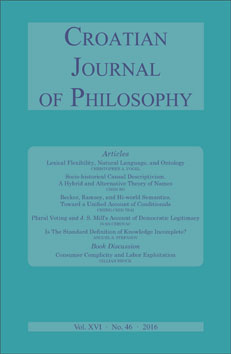Lexical Flexibility, Natural Language, and Ontology
Lexical Flexibility, Natural Language, and Ontology
Author(s): Christopher A. VogelSubject(s): Metaphysics, Logic, Analytic Philosophy, Philosophy of Language
Published by: KruZak
Keywords: Ontology; realism; polysemy; metaphysical methodology; externalism; internalism;
Summary/Abstract: The Realist that investigates questions of ontology by appeal to the quantificational structure of language assumes that the semantics for the privileged language of ontology is externalist. I argue that such a language cannot be (some variant of) a natural language, as some Realists propose. The flexibility exhibited by natural language expressions noted by Chomsky and others cannot obviously be characterized by the rigid models available to the externalist. If natural languages are hostile to externalist treatments, then the meanings of natural language expressions serve as poor guides for ontological investigation, insofar as their meanings will fail to determine the referents of their constituents. This undermines the Realist’s use of natural languages to settle disputes in metaphysics.
Journal: Croatian Journal of Philosophy
- Issue Year: XVI/2016
- Issue No: 46
- Page Range: 1-44
- Page Count: 44
- Language: English
- Content File-PDF

